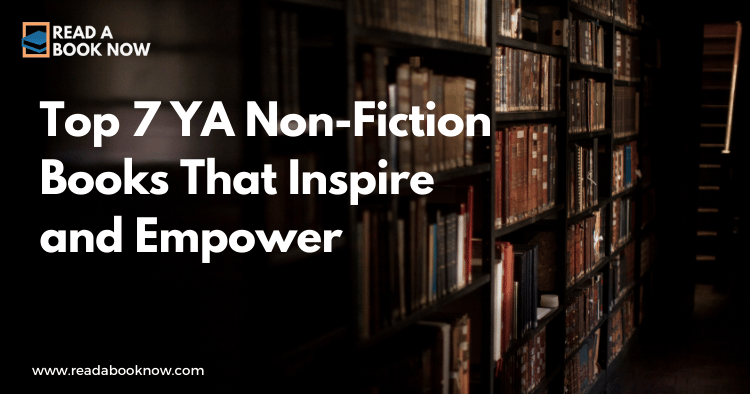Table of Contents
- Introduction
- 1. “I Am Malala” by Malala Yousafzai
- 2. “The Hate U Give” by Angie Thomas
- 3. “They Called Us Enemy” by George Takei
- 4. “This Book Is Anti-Racist” by Tiffany Jewell
- 5. “Becoming” by Michelle Obama
- 6. “Dear Martin” by Nic Stone
- 7. “The 57 Bus” by Dashka Slater
- Conclusion
- FAQs
Introduction
In a world brimming with challenges and rapid changes, young adults seek knowledge and inspiration. Young Adult (YA) non-fiction books serve as powerful tools for empowerment, offering real-life stories that resonate with the struggles and aspirations of today’s youth.
“Books are a uniquely portable magic.” — Stephen King
Whether it’s addressing social justice, personal identity, or the importance of education, these books provide guidance and motivation. Here, we delve into the top seven YA non-fiction titles that inspire and empower, equipping young readers with the knowledge they need to navigate their own journeys.
1. “I Am Malala” by Malala Yousafzai
“I Am Malala” is the compelling memoir of Malala Yousafzai, the youngest-ever Nobel Prize laureate. Malala’s story is a vivid portrayal of her fight for education in Pakistan, a pursuit that led to an assassination attempt by the Taliban. This book not only inspires readers to value education but also highlights the importance of standing up for one’s beliefs. Malala’s courage and resilience empower young adults to advocate for their rights and the rights of others.
Key Takeaways:
- The importance of education, especially for girls.
- Standing up against oppression.
- The power of voice and advocacy.
Learn more about Malala’s work at Malala Fund.
2. “The Hate U Give” by Angie Thomas
While “The Hate U Give” is often categorized as a novel, it is deeply rooted in real-world issues such as systemic racism and police violence. Angie Thomas weaves a narrative that reflects the lives of many young adults grappling with identity and activism.
“We’re all human. We all deserve to be treated with respect.” — Angie Thomas
The protagonist, Starr Carter, navigates her life between two worlds—a poor neighborhood and a wealthy school—while dealing with the aftermath of witnessing a friend’s shooting by police. This book serves as a catalyst for conversations about race, privilege, and justice.
Key Takeaways:
- Understanding systemic racism.
- The importance of community and activism.
- Navigating identity in a polarized society.
Explore more themes in social justice through American Civil Liberties Union (ACLU).
3. “They Called Us Enemy” by George Takei
In this graphic memoir, George Takei recounts his experiences as a Japanese-American child during World War II. Forced into an internment camp along with his family, Takei’s story sheds light on the harsh realities of prejudice and discrimination.
“The oppressors will always try to discredit the victims.” — George Takei
This book not only inspires resilience but also encourages readers to reflect on the importance of tolerance and understanding in today’s society.
Key Takeaways:
- The impact of discrimination on individuals and communities.
- The importance of standing against injustice.
- The historical context of civil liberties.
For more information on civil rights, visit the National Museum of African American History and Culture.
4. “This Book Is Anti-Racist” by Tiffany Jewell
Tiffany Jewell’s “This Book Is Anti-Racist” serves as a guide for young readers to understand and combat racism. The book offers practical tools and insights, encouraging readers to reflect on their own biases and to take action against inequality.
“To be anti-racist is to be actively engaged in the work of dismantling racism.” — Tiffany Jewell
Jewell’s engaging writing style and clear layout make complex topics accessible and engaging, empowering young adults to become active participants in the fight for justice.
Key Takeaways:
- Understanding personal biases.
- Practical strategies for anti-racism.
- The importance of allyship.
Discover more resources on anti-racism at Race Forward.
5. “Becoming” by Michelle Obama
In her memoir, Michelle Obama shares the intimate story of her life, from her childhood in Chicago to her years as First Lady of the United States. “Becoming” is an inspiring journey of self-discovery, resilience, and empowerment.
“Your story is what you have, what you will always have. It is something to own.” — Michelle Obama
Through her experiences, Obama emphasizes the importance of education, making choices, and the power of community engagement, encouraging young adults to embrace their own narratives.
Key Takeaways:
- The significance of self-identity and confidence.
- The role of education in personal success.
- The impact of community service.
Explore Michelle Obama’s initiatives at When We All Vote.
6. “Dear Martin” by Nic Stone
“Dear Martin” follows the story of Justyce McAllister, a Black teenager who grapples with racial profiling and the complexities of identity. Through letters to Dr. Martin Luther King Jr., Justyce reflects on his experiences and the societal issues surrounding him.
“Sometimes you need to step outside, get some air, and remind yourself of who you are and who you want to be.” — Nic Stone
Stone’s poignant narrative encourages young adults to think critically about race, justice, and their roles in creating change.
Key Takeaways:
- The realities of racial profiling and discrimination.
- The importance of dialogue about race.
- Finding one’s voice in the quest for justice.
Learn more about racial justice at Color Of Change.
7. “The 57 Bus” by Dashka Slater
“The 57 Bus” tells the true story of a chance encounter between two teens on a bus in Oakland, California, that leads to a life-altering event. Dashka Slater explores themes of gender identity, race, and the criminal justice system, making it a powerful read for young adults.
“Empathy is about finding echoes of another person in yourself.” — Dashka Slater
This book empowers readers to understand the complexities of identity and the impact of their actions.
Key Takeaways:
- Understanding gender identity and expression.
- The effects of violence and crime on young lives.
- The importance of empathy and understanding.
For further exploration of gender identity, visit GLAAD.
Conclusion
These seven YA non-fiction books serve as beacons of inspiration and empowerment for young adults. They tackle pressing issues such as racism, education, and identity, encouraging readers to engage with the world around them.
“Reading is a form of activism.” — Unknown
By immersing themselves in these powerful narratives, young adults can cultivate the knowledge, empathy, and courage necessary to become advocates for change in their own lives and communities.
Also Look For
In addition to these empowering titles, consider exploring classic literature that has shaped societal perspectives through the ages. For instance, works from the Top 10 Must-Read 19th Century Classics provide foundational insights into historical social issues and personal struggles that resonate with today’s themes in YA non-fiction.
For more contemporary narratives, check out the 10 Must-Read Modern Classics that reflect current societal challenges and triumphs, further enriching young adults’ understanding of the world they inhabit.
FAQs
Q: What age group is YA non-fiction intended for?
A: YA non-fiction is generally aimed at readers aged 12 to 18, but it can be enjoyed by readers of all ages.
Q: How can reading non-fiction empower young adults?
A: Non-fiction can provide real-world insights, encourage critical thinking, and inspire action on important social issues.
Q: Are these books suitable for educational purposes?
A: Yes, these books can serve as excellent resources for discussions on social justice, history, and personal development in classroom settings.
Q: Where can I find these books?
A: Most of these titles are available at local bookstores, libraries, and online retailers like Amazon.
Q: Can you recommend any additional resources for young readers?
A: Websites like Goodreads and Common Sense Media offer a wealth of information and recommendations.




